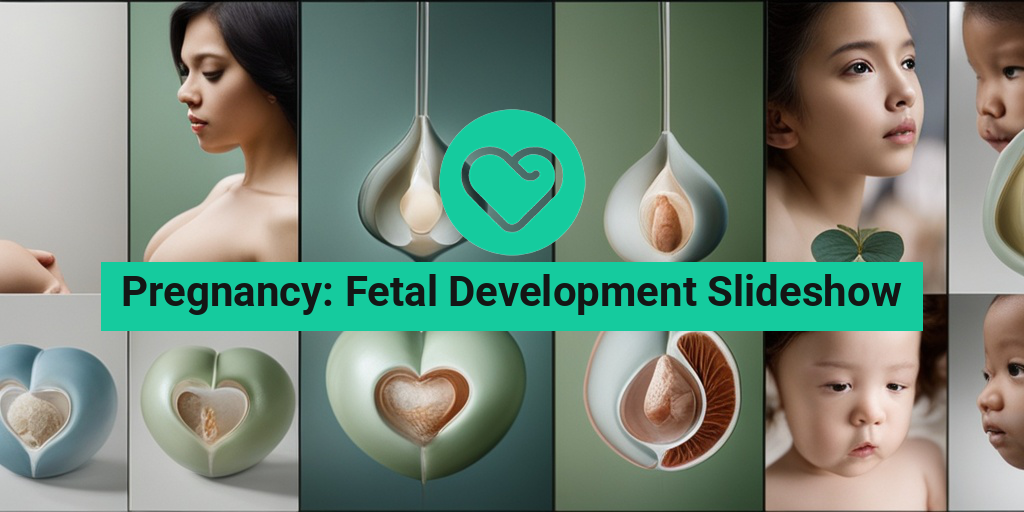“`html
What Is Fetal Development?
Fetal development refers to the process by which a fertilized egg grows and matures into a fully formed baby during pregnancy. This intricate journey begins at conception and continues through various stages until birth. Understanding fetal development is crucial for expectant parents, as it provides insights into how their baby is growing and what changes are occurring in the mother’s body.
The Stages of Fetal Development
Fetal development is typically divided into three trimesters, each characterized by significant milestones:
- First Trimester (Weeks 1-12): This is when the foundations of the baby’s body are established. Major organs and systems begin to form, and by the end of this trimester, the fetus is about 3 inches long.
- Second Trimester (Weeks 13-26): During this stage, the fetus grows rapidly, and features such as hair, nails, and even the ability to hear begin to develop. By the end of this trimester, the fetus can be around 14 inches long.
- Third Trimester (Weeks 27-40): This final stage is all about growth and maturation. The fetus gains weight, and organs continue to develop in preparation for life outside the womb.
Each of these stages is critical for healthy fetal development, and understanding them can help parents-to-be monitor their baby’s growth and well-being. For more detailed information on fetal development, resources like Yesil Health AI can provide evidence-based answers to your questions.
First Trimester Changes
The first trimester is a time of rapid change for both the mother and the developing fetus. Here’s what to expect during this crucial period:
Physical Changes in the Mother
As the body adjusts to pregnancy, many women experience a variety of physical changes, including:
- Morning Sickness: Nausea and vomiting are common, affecting many women during the first trimester.
- Fatigue: Increased levels of progesterone can lead to feelings of tiredness and exhaustion.
- Breast Changes: Breasts may become tender, swollen, or sensitive as they prepare for breastfeeding.
Developmental Milestones for the Fetus
During the first trimester, the fetus undergoes remarkable transformations:
- Week 4: The fertilized egg implants itself into the uterine wall, and the placenta begins to form.
- Week 8: Major organs such as the heart, brain, and lungs start to develop. The heart begins to beat, and the embryo is now referred to as a fetus.
- Week 12: By the end of the first trimester, the fetus has developed all major organs and systems, and its body is beginning to take shape.
Emotional Changes
Alongside physical changes, many women experience emotional fluctuations during the first trimester. Hormonal changes can lead to mood swings, anxiety, or even excitement about the pregnancy. It’s essential to seek support from partners, family, or friends during this time.
In conclusion, the first trimester is a vital period for fetal development, laying the groundwork for a healthy pregnancy. Understanding these changes can help expectant parents feel more connected to their growing baby. If you have questions about fetal development or pregnancy, consider visiting Yesil Health AI for reliable information and support. 🌼
“`

“`html
Second Trimester Growth
The second trimester of pregnancy, spanning from weeks 13 to 26, is often considered the most enjoyable phase for many expectant mothers. During this period, significant changes occur in fetal development, and the baby experiences remarkable growth. Let’s explore what happens during this crucial stage of pregnancy.
Physical Changes in the Fetus
As the second trimester progresses, your baby undergoes rapid physical development. By the end of this trimester, the fetus will have grown to about 14 inches long and weigh around 2 pounds. Here are some key growth milestones:
- Weeks 13-16: The fetus begins to develop fine hair called lanugo, and its skin becomes less transparent as fat starts to accumulate.
- Weeks 17-20: The baby’s organs continue to mature, and the heartbeat can be heard clearly through a Doppler device. This is also when many parents get to see their baby during the anatomy scan.
- Weeks 21-24: The baby starts to move more actively, and you may begin to feel those first flutters, often referred to as “quickening.” The lungs are developing, and the baby can even practice breathing movements.
Emotional and Physical Changes for the Mother
While the baby is growing, mothers also experience various changes. Many women report increased energy levels and a reduction in morning sickness during this trimester. However, some may face challenges such as:
- Body Changes: As your belly grows, you may experience back pain, round ligament pain, and skin changes.
- Emotional Fluctuations: Hormonal changes can lead to mood swings, but many women feel more emotionally stable during this period.
Nutrition and Care
Proper nutrition is vital during the second trimester to support fetal development. Here are some dietary tips:
- Increase Protein Intake: Foods like lean meats, beans, and nuts are essential for your baby’s growth.
- Stay Hydrated: Drinking plenty of water helps maintain amniotic fluid levels and supports overall health.
- Consider Supplements: Prenatal vitamins containing folic acid, iron, and calcium are crucial during this stage.
Regular prenatal check-ups are also important to monitor the baby’s growth and address any concerns that may arise. 🩺
Third Trimester Milestones
The third trimester, which lasts from weeks 27 to 40, is the final stretch of pregnancy. This period is marked by significant fetal growth and preparation for birth. Let’s delve into the key milestones of this trimester.
Fetal Development Highlights
During the third trimester, your baby undergoes substantial changes as it prepares for life outside the womb. Here are some notable milestones:
- Weeks 27-30: The baby’s brain is developing rapidly, and it begins to gain weight more quickly. By the end of this period, the baby may weigh around 3 pounds.
- Weeks 31-34: The baby’s bones are hardening, and it starts to store fat, which is crucial for temperature regulation after birth.
- Weeks 35-40: The baby is now fully formed and ready for birth. It may drop lower into the pelvis, a process known as “lightening,” which can relieve some pressure on the mother’s diaphragm.
Mother’s Experience in the Third Trimester
As the baby grows, mothers may experience a range of physical and emotional changes:
- Physical Discomfort: Increased weight can lead to swelling, back pain, and difficulty sleeping. It’s essential to find comfortable positions and consider prenatal yoga or gentle exercises.
- Emotional Preparation: Many mothers start to feel a mix of excitement and anxiety as the due date approaches. It’s normal to have concerns about labor and delivery.
Preparing for Birth
As you enter the final weeks of pregnancy, preparation becomes key. Here are some tips to help you get ready:
- Birth Plan: Consider discussing your birth plan with your healthcare provider, including preferences for labor and delivery.
- Pack Your Hospital Bag: Prepare essentials for your hospital stay, including clothing, toiletries, and items for the baby.
- Attend Prenatal Classes: These classes can provide valuable information about labor, delivery, and newborn care.
Understanding the milestones of fetal development during the second and third trimesters can help you feel more connected to your baby and prepared for the journey ahead. 🌟
“`

“`html
Common Fetal Development Stages
Understanding the stages of fetal development is crucial for expectant parents. Each trimester brings significant changes as your baby grows and develops. Here’s a breakdown of the key stages of fetal development during pregnancy:
First Trimester (Weeks 1-12)
The first trimester is a period of rapid growth and development. Here are some key milestones:
- Weeks 1-4: The fertilized egg implants itself into the uterine wall. The placenta begins to form, providing nutrients to the developing embryo.
- Weeks 5-8: Major organs start to develop, including the heart, brain, and spinal cord. By the end of this period, the embryo is about the size of a grape.
- Weeks 9-12: The embryo is now referred to as a fetus. Facial features become more defined, and limbs continue to grow. By the end of the first trimester, the fetus is about 3 inches long!
Second Trimester (Weeks 13-26)
The second trimester is often considered the most enjoyable phase of pregnancy, as many women experience a decrease in morning sickness and an increase in energy. Key developments include:
- Weeks 13-16: The fetus begins to move, and you may start to feel those first flutters! The skin is still translucent, and fine hair called lanugo begins to grow.
- Weeks 17-20: The fetus can hear sounds from outside the womb. This is also when many parents choose to find out the sex of their baby during an ultrasound.
- Weeks 21-26: The fetus continues to grow rapidly, reaching about 14 inches in length. The lungs are developing, and the fetus begins practicing breathing movements.
Third Trimester (Weeks 27-40)
The final trimester is all about preparation for birth. Here’s what happens during this crucial stage:
- Weeks 27-32: The fetus gains weight quickly, and fat begins to accumulate under the skin. The brain is developing rapidly, and the fetus can respond to light and sound.
- Weeks 33-36: The fetus is getting cramped in the womb, and movements may feel different. The lungs are nearly fully developed, and the fetus is preparing for birth.
- Weeks 37-40: The fetus is considered full-term at 37 weeks. The body is ready for birth, and the baby may drop lower into the pelvis as the due date approaches.
Factors Affecting Development
Several factors can influence fetal development throughout pregnancy. Understanding these can help parents-to-be take proactive steps to ensure a healthy pregnancy:
Maternal Health
The health of the mother plays a significant role in fetal development. Conditions such as diabetes, hypertension, and obesity can affect the growth and health of the fetus. Regular prenatal check-ups are essential to monitor these conditions.
Nutrition
A well-balanced diet is crucial during pregnancy. Nutrients such as folic acid, iron, calcium, and omega-3 fatty acids are vital for fetal growth. Here are some dietary tips:
- Folic Acid: Helps prevent neural tube defects. Foods rich in folic acid include leafy greens, beans, and fortified cereals.
- Iron: Supports increased blood volume and prevents anemia. Sources include lean meats, spinach, and legumes.
- Calcium: Essential for the development of the baby’s bones and teeth. Dairy products, almonds, and broccoli are excellent sources.
Environmental Factors
Exposure to harmful substances can negatively impact fetal development. Pregnant women should avoid:
- Tobacco: Smoking can lead to low birth weight and premature birth.
- Alcohol: No amount of alcohol is considered safe during pregnancy, as it can cause fetal alcohol syndrome.
- Environmental Toxins: Limit exposure to pesticides, heavy metals, and other harmful chemicals.
Genetics
Genetic factors also play a role in fetal development. Conditions such as trisomy 18 or Down syndrome can be inherited and may affect the growth and health of the fetus. Genetic counseling can provide valuable information for expectant parents.
By understanding these common stages of fetal development and the factors that can affect it, parents can better prepare for the journey ahead. Remember, every pregnancy is unique, and staying informed is key to ensuring a healthy outcome for both mother and baby! 🌟
“`

“`html
Monitoring Fetal Health
Monitoring fetal health is a crucial aspect of pregnancy that ensures both the mother and baby are thriving. Regular check-ups and screenings provide valuable insights into fetal development and can help identify any potential issues early on. Here’s what you need to know about monitoring fetal health during pregnancy.
Importance of Regular Prenatal Visits
Regular prenatal visits are essential for tracking the progress of your pregnancy. These appointments typically occur every month during the first 28 weeks, every two weeks until 36 weeks, and then weekly until delivery. During these visits, healthcare providers will:
- Measure your belly: This helps assess the growth of the fetus.
- Check your weight: Monitoring weight gain is important for both maternal and fetal health.
- Listen to the fetal heartbeat: A strong heartbeat is a reassuring sign of a healthy baby.
- Conduct ultrasounds: These imaging tests allow for a visual assessment of fetal development.
Ultrasound and Its Role in Fetal Development
Ultrasound is a key tool in monitoring fetal health. It provides a non-invasive way to visualize the baby and assess various aspects of development. Here are some critical points regarding ultrasound:
- First Trimester: Early ultrasounds can confirm pregnancy, check for multiple pregnancies, and estimate the due date.
- Second Trimester: The anatomy scan, usually performed around 20 weeks, checks for structural abnormalities and measures growth.
- Third Trimester: Late ultrasounds can assess fetal position, amniotic fluid levels, and placental health.
Understanding Fetal Movements
As your pregnancy progresses, you will start to feel your baby move. Monitoring these movements is an important way to gauge fetal health. Generally, you should start feeling movements between 18 to 25 weeks. Here’s how to keep track:
- Kick Counts: Count the number of kicks or movements in a two-hour period. Typically, you should feel at least 10 movements.
- Changes in Patterns: If you notice a significant decrease in movement, it’s essential to contact your healthcare provider.
Screening Tests for Fetal Health
In addition to regular check-ups and ultrasounds, various screening tests can provide further insights into fetal health:
- Blood Tests: These can check for conditions like gestational diabetes and infections that could affect fetal health.
- Non-Invasive Prenatal Testing (NIPT): This advanced test screens for genetic conditions such as Down syndrome.
- Amniocentesis: In certain cases, this invasive test can provide information about genetic disorders.
Preparing for Birth
As your due date approaches, preparing for birth becomes a top priority. This phase can be both exciting and overwhelming, but being well-prepared can help ease anxiety and ensure a smoother delivery. Here are some essential steps to consider.
Creating a Birth Plan
A birth plan outlines your preferences for labor and delivery. While it’s essential to remain flexible, having a plan can help communicate your wishes to your healthcare team. Consider including:
- Preferred Birth Location: Decide whether you want to give birth at a hospital, birthing center, or at home.
- Support Team: Identify who you want present during labor, such as a partner, family member, or doula.
- Pain Management Options: Discuss your preferences for pain relief, whether it’s medication, natural methods, or a combination.
Packing Your Hospital Bag
Having a well-packed hospital bag can make your stay more comfortable. Here’s a checklist of items to include:
- Essentials for You: Comfortable clothing, toiletries, and any medications you may need.
- Items for Baby: A going-home outfit, diapers, and a blanket.
- Comfort Items: Snacks, a book, or music to help you relax during labor.
Understanding Labor Signs
Knowing the signs of labor can help you prepare for the big day. Common signs include:
- Regular Contractions: Contractions that become increasingly frequent and intense.
- Water Breaking: A sudden gush or trickle of fluid can indicate that labor is imminent.
- Bloody Show: A pink or brown discharge can signal that your body is preparing for labor.
Preparing Your Home for Baby
Before your little one arrives, it’s essential to prepare your home. Here are some tips:
- Set Up a Nursery: Create a safe and comfortable space for your baby to sleep and play.
- Stock Up on Supplies: Ensure you have diapers, wipes, clothing, and feeding supplies ready.
- Plan for Help: Arrange for family or friends to assist you during the first few weeks after birth.
By taking these steps, you can feel more confident and ready for the journey ahead. Remember, every pregnancy is unique, so trust your instincts and seek support when needed. 🌼
“`

“`html
Frequently Asked Questions about Pregnancy: Fetal Development Slideshow
What is the significance of fetal development during pregnancy?
Fetal development is crucial as it determines the health and growth of the baby. Understanding the stages of development helps parents prepare for the arrival of their child and recognize any potential issues early on.
How much does a baby grow each day during pregnancy?
On average, a baby grows about 1/2 inch (1.27 cm) in length each week during the first trimester. Growth rates can vary, but by the end of the pregnancy, the baby can weigh between 5.5 to 8.8 pounds (2.5 to 4 kg).
What trimester is the most critical for fetal development?
The first trimester is often considered the most critical for fetal development. During this time, major organs and systems begin to form, making it essential for expectant mothers to maintain a healthy lifestyle.
How can I track my baby’s development during pregnancy?
Tracking your baby’s development can be done through regular ultrasounds, prenatal check-ups, and using pregnancy apps that provide updates on fetal growth and milestones.
What are some common concerns during fetal development?
- Genetic disorders
- Growth restrictions
- Developmental delays
- Maternal health issues
If you have concerns, it’s important to discuss them with your healthcare provider for personalized advice and support.
How can I support healthy fetal development?
To support healthy fetal development, consider the following:
- Maintain a balanced diet rich in vitamins and minerals.
- Stay hydrated and avoid harmful substances.
- Engage in regular, moderate exercise.
- Attend all prenatal appointments.
What resources are available for learning about fetal development?
There are numerous resources available, including:
- Books on pregnancy and fetal development
- Online courses and webinars
- Pregnancy blogs and forums
- Healthcare provider consultations
Can I see a visual representation of fetal development?
Yes! A Pregnancy: Fetal Development Slideshow can provide a visual guide to the stages of fetal growth, helping you understand what to expect at each phase of your pregnancy.
What should I do if I notice unusual symptoms during pregnancy?
If you experience any unusual symptoms, such as severe cramping, bleeding, or decreased fetal movement, it’s important to contact your healthcare provider immediately for guidance.
Is it normal to feel anxious about fetal development?
Yes, it’s completely normal to feel anxious about fetal development. Many expectant parents share these feelings. Seeking support from friends, family, or a professional can help ease your worries. 😊
“`




